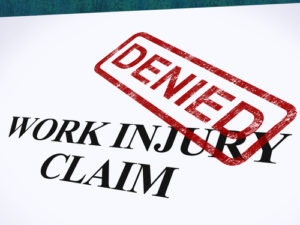A Santa Rosa workers’ compensation lawyer can advise California employees about their right to benefits after a claim is denied
Occasionally, a workers’ compensation insurance company will deny an injured worker’s claim. When that happens, a Santa Rosa workers’ compensation attorney can help the injured worker obtain the compensation that the law requires.
 Denials of Workers’ Compensation Claims
Denials of Workers’ Compensation Claims
Workers’ compensation claims can be denied for several reasons. Here are some of the most common reasons:
1. The injured worker missed deadlines
Work-related injuries should be reported to the employer within 30 days after they occur. Conditions and diseases that develop over time should be reported within 30 days after the injured worker realizes they are work-related. A claims administrator will likely deny the claim if an injured worker fails to meet reporting deadlines.
When an injured worker’s entitlement to benefits (or additional benefits) is contested, she may lose the ability to obtain benefits by waiting too long to challenge the claims administrator’s denial. Proceedings must usually be commenced within one year of the claim being denied or from the date the last benefits were provided, although a longer time period may apply in some cases. Hiring a Santa Rosa workers’ compensation lawyer immediately after a claim is denied will assure that proceedings are commenced on time.
2. The injury is not work-related
Workers’ compensation benefits are only paid in relation to work-related injuries. An employee who is injured at home or in a car accident (unless the employee was driving for an employment-related purpose) is not entitled to for workers’ compensation benefits.
Claims administrators almost always deny claims when nobody witnessed the event that caused the injury. When other employees witness the injury, there isn’t usually any doubt as to whether or not the injury is work-related. Claims administrators generally deny claims when the injury is not immediately reported to the employer. Always report your work injury to a supervisor as soon as possible.
Claims might also be denied when the claim is based on a condition or disease that developed gradually over time. Repetitive stress injuries and occupational diseases caused by the work environment are more likely to be challenged than specific injuries because their causes are not always clear. Denying claims is a way for insurance companies to save money.
3. The injured worker was not an employee
When an employee reports a work injury to the employer immediately after it occurs, employment status is not usually an issue. Employment status is more likely to be contested when an employee first makes a claim after his or her employment has ended. An injured worker who reports her injury after being separated from her employment, will almost always have her claim denied. This is another reason why injuries should always be reported to the employer immediately.
Claims are also denied when an employer claims that a worker was not an employee but was an independent contractor. Many employers misidentify their employees as independent contractors. Sometimes they do so deliberately to avoid contributing to payroll taxes and other benefits (including workers’ compensation insurance) that only apply to employees. Sometime employers are simply ignorant of the California test that distinguishes employees from independent contractors. The label assigned by the employer is not part of that test. However, when an employer has misclassified an employee as an independent contractor, the claims administrator will usually deny the workers’ compensation claim.
4. No injury occurred
The insurance industry works hard to spread the myth that fraudulent workers’ compensation claims are rampant. Relying on that myth, claims administrators sometimes deny that there was an injury. Or, they assert that the injured worker is faking the injury simply to collect workers’ compensation benefits.
5. The injury has healed
Sometimes the claims administrator will not dispute a workers’ compensation claim, but will stop paying temporary disability benefits to soon, or will deny permanent disability benefits, claiming the injury has completely healed. The claims administrator might disagree with the treating physician’s assessment of the injury and might insist on a Qualified Medical Evaluation (QME), and terminate all benefits until that process has been completed.
What to Do After a Claim Is Denied
The proper step to take after a claim is denied depends on the reason for the denial. If the Claims Administrator asserts that the injury is not work-related, it is helpful to find witnesses who can corroborate the injury. If the Claims Administrator denies that the injured worker was an employee, a workers’ compensation attorney can review the circumstances of the work to determine whether the worker is entitled to workers’ compensation benefits.
If the Claims Administrator denies an injury happened or asserts that it has healed, it may be necessary to obtain additional medical evidence. If the Claims Administrator wants an opinion from a QME, it is important to have input into the selection of the physician who will conduct the medical review.
Effectively challenging the denial of a claim requires a thorough knowledge of California workers’ compensation law. The starting point when a workers’ compensation claim has been denied is to review the facts with an experienced workers’ compensation lawyer. Contact the Santa Rosa firm of Kneisler & Schondel at (707) 542-5132 or use our online contact form to inquire about the denial of your workers’ compensation claim.